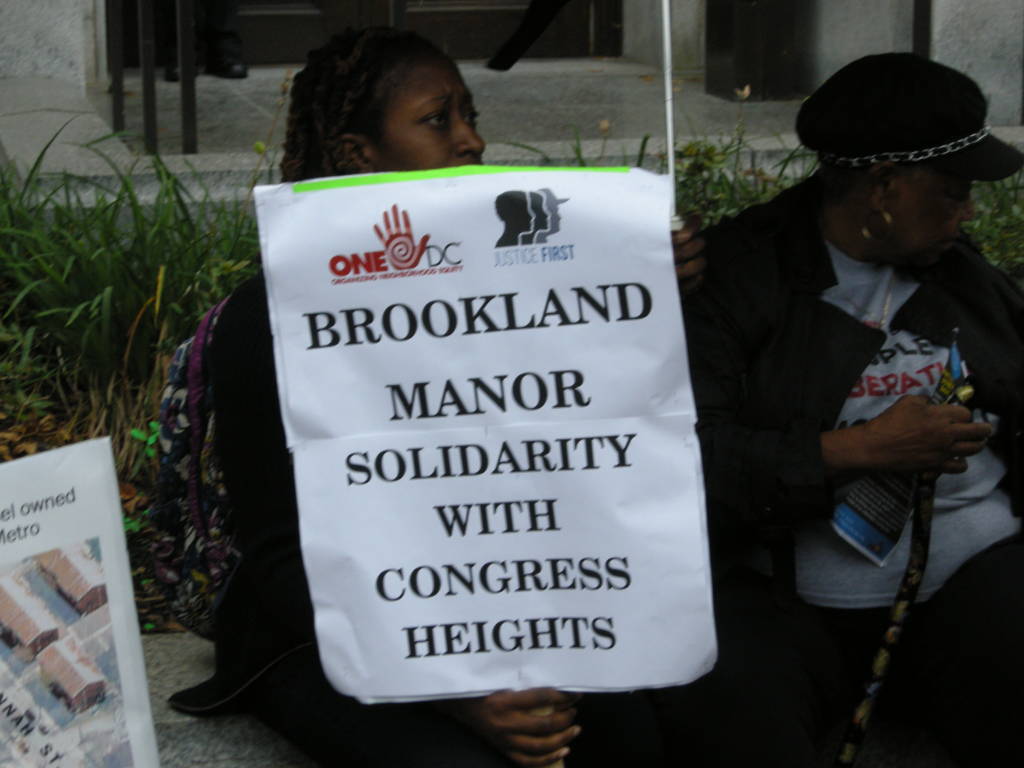For the past three years, low-income residents have seen new development project after new development project going up in their neighborhoods, claiming to change their communities for the better. However, on Sept. 6, residents of the Congress Heights and Brookland Manor neighborhoods held a press conference to ask Mayor Bowser and the D.C. Council to listen to their thoughts about development in the area.
“We, the tenants of Congress Heights, have gone through a lot the last five years under Sanford Capital,” said Robert Green, a Congress Heights resident. “The mayor and the D.C. City Council have been giving away property for a dollar; they give away property like mad at low prices.” The residents have been working with a staff attorney, Will Merrifield, from the Washington Legal Clinic for the Homeless. Merrifield spoke about the residents’ resolve to combat housing instability, saying, “If it were not for the Congress Heights Tenant Association, they wouldn’t know about Sanford Capital. They went through hell going through this process.”
The now infamous Sanford Capital came under intense government scrutiny earlier this year when Washington City Paper laid bare the Bethesda-based company’s “systemic strategy” of letting properties rot in order to force tenants to leave and make way for new development. The company had racked up more than $100,000 in housing code violations over several years before the story came out. And many of its properties were found to be contracted by the city’s affordable housing initiatives. Mayor Muriel Bowser called for full inspection of Sanford properties and the company’s outstanding code-violation fines quickly surpassed half a million dollars. Sanford Capital has denied many charges but faces a tangle of lawsuits from nonprofits, individuals and the attorney general, as well as court-ordered negotiations with tenants in Congress Heights. According to a Bisnow report, the company has sold off two properties and plans to “unload its entire D.C. portfolio.”
While Sanford is moving on, tenants still worry about the plan to put luxury apartments in the area currently occupied by their buildings. “There are thirteen of us left,” Green said. “We refuse to move. They cannot do [anything] with us living there.” He described himself as a poor senior on a fixed income seeking only a decent place to live.

Eugene Puryear, president of the advocacy group Justice First, praised the past efforts of the tenants. “What you have done is miraculous,” he said.“You failed to be intimidated, you failed to be bullied. This is a grassroots movement of people.”
In a March performance oversight hearing for D.C. Housing Authority, officials asked about various issues involving Sanford Capital. “How many times have we terminated contracts with landlords because of code-enforcement issues?” questioned At-Large Councilmember Elissa Silverman. Then-director Adrianne Todman replied, “Multiple times.”
Also at the hearing, At-Large Councilmember Anita Bonds said that she was concerned that 65 percent of units inspected by the D.C. Housing Authority had failed inspection. “I want to know just what housing providers are giving us,” she said. “We, as a government, need to consider across the board how our residents are being treated. There are plenty of units that are substandard across the city.”
Councilmember Bonds recently introduced the Housing Code Enforcement Integrity Amendment Act of 2017 to limit the time landlords may take to address housing code violations. Currently, once the Department of Consumer and Regulatory Affairs issues a building-code infraction, the property owner may take years to correct unlawful conditions without incurring additional penalties.
“No one wants to admit they are kicking people out of their homes,” Puryear said of developers and local government at the Sept. 6 press conference. “[Mayor Bowser] could stop this cycle in its tracks by working with the Tenants Association of Congress Heights. They can do something transformative here. We are not going to give up until the right thing happens here at Congress Heights.”
Resident Ivan Johnson spoke on his neighborhood’s behalf. “We have always stood for equality, What we have to do is show them that our vote counts. We gotta let them know we’re not going to take this anymore.”
Merrifield, the Legal Clinic attorney, said that when he got involved with the Tenants Association years ago, building conditions were, and still are, poor. He believes a building that D.C. government owns at 3200 Alabama Avenue SE, amid the other developer-owned complexes, is the key to neighborhood’s future. The building could be converted to 200 units of affordable housing by Merrifield’s assessment. Puryear doubted that would be its use, however, reminding attendees that, in addition to being right next to the Metro station, 3200 Alabama Avenue SE sits next to the $65 million Washington Wizards practice stadium development.
Video by Reginald Black








